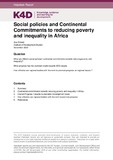| dc.contributor.author | Enfield, Sue | |
| dc.date.accessioned | 2020-11-19T13:40:07Z | |
| dc.date.available | 2020-11-19T13:40:07Z | |
| dc.date.issued | 2020-11 | |
| dc.identifier.citation | Enfield, S. (2020). Social policies and Continental Commitments to reducing poverty and inequality in Africa. K4D Helpdesk Report. Brighton, UK: Institute of Development Studies. | en |
| dc.identifier.uri | https://opendocs.ids.ac.uk/opendocs/handle/20.500.12413/15789 | |
| dc.description.abstract | This report synthesises evidence on Africa’s social policies/ continental commitments towards reducing poverty and inequality, including progress that the continent has made towards SDG targets and the effectiveness of regional bodies with the remit to promote progress on regional issues. Continental commitments made to address poverty and inequality across Africa sometimes a decade earlier, now exist in an arena where the focus of development is firmly on the Sustainable Development Goals. These are a holistic agenda for development of all countries and already contain the principle of “leave no one behind”. Nation States have made commitments to work towards Sustainable Development Goals and targets; reporting against these comes from national level data. International development architecture that supports national governments is dominated by UN agencies and driven in particular by the UN Economic Commission for Africa (UN ECA) whose strength derives from its role as the only UN agency mandated to operate at the regional and subregional levels, to harness resources and bring them to bear on Africa's priorities. African institutions derive legitimacy from the African Union (of all 55 member states) and drive Africa’s growth and economic development. Eight sub regional bodies are the building blocks of the African Economic Community (established in 1991) which provides the overarching framework for continental economic integration. To some extent there is a ‘missing middle’ between global/continental targets framed by UN or AU goals and country level national development policy and plans which address those same targets. The predominance of reporting against UN goals and programmes over AU initiatives and frameworks illustrates this. Although in theory several policy positions are crafted at subregional level and then advocated for by subregional blocks, and in a reverse process agreements at AU level will often be analysed at sub-regional level before being domesticated this report has not been able to identify reporting that tracks implementation against regional plans or considers efficacy of this process. | en |
| dc.description.sponsorship | FCDO (Foreign, Commonwealth and Development Office) | en |
| dc.language.iso | en | en |
| dc.publisher | Institute of Development Studies | en |
| dc.relation.ispartofseries | K4D Helpdesk Report;917 | |
| dc.rights.uri | https://www.nationalarchives.gov.uk/doc/open-government-licence/version/3/ | en |
| dc.subject | Poverty | en |
| dc.subject | Rights | en |
| dc.subject | Social Protection | en |
| dc.title | Social Policies and Continental Commitments to Reducing Poverty and Inequality in Africa | en |
| dc.type | Helpdesk | en |
| dc.rights.holder | © Crown copyright 2020 | en |
| dcterms.dateAccepted | 2020-11 | |
| rioxxterms.funder | Default funder | en |
| rioxxterms.funder | Department for International Development, UK Government | en |
| rioxxterms.identifier.project | Default project | en |
| rioxxterms.identifier.project | K4D | en |
| rioxxterms.version | VoR | en |
| rioxxterms.funder.project | 9ce4e4dc-26e9-4d78-96e9-15e4dcac0642 | en |
| rioxxterms.funder.project | 238a9fa4-fe4a-4380-996b-995f33607ba0 | en |

